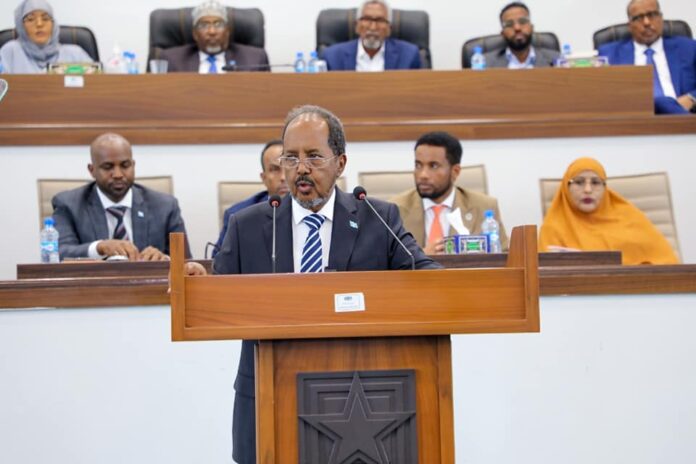MOGADISHU (KAAB TV) – In a bid to reshape Somalia’s political landscape, President Hassan Sheikh Mohamud has set forth a contentious plan to overhaul the nation’s provisional constitution.
The move, however, has sparked widespread opposition and raised concerns about its implications for the country’s future.
The current Provisional Federal Constitution, adopted in August 2012, emerged from a complex clan-based power-sharing formula known as 4.5, involving four major and one minor clans. It served as a crucial framework guiding Somalia’s transition from a transitional federal government to a federal system.
Yet, Somalia’s history of civil war and lack of true reconciliation between clans, armed groups and political sides have hindered progress.
Since the 1991 deadly conflict, the only viable system in place has been the clan-based power-sharing structure that established the federal government in 2004.
A large portion of the country remain under the control of Al-Shabaab, a terror group linked with Al-Qaeda, while the northern territory is governed by Somaliland, which declared independence from the rest of Somalia.
Due to these factors, a constitutional referendum has never been feasible, leaving the current constitution in a provisional state.
Proposed Changes
President Mohamud’s proposal seeks to enact significant alterations to the constitution, including a shift away from the existing indirect electoral process.
Critics argue that this move aims to consolidate power and potentially extend the president’s term and powers beyond its mandated limit.
Additionally, plans to establish an 18-member electoral body, solely appointed by the president, have raised concerns about impartiality and fairness in future elections.
Opposition politicians and lawmakers have vehemently opposed the unilateral approach taken by President Mohamud, decrying it as an imposition lacking consensus among stakeholders.
Puntland State has outright rejected the proposed changes, signaling potential rifts within the federal system. Moreover, a significant portion of federal lawmakers have moved to withdraw support for the constitutional amendments, reflecting deep divisions within Somalia’s political landscape.
Complicating matters further are the impending elections in the four regional states namely Galmudug, Hirshabelle, Southwest and Jubbaland, coinciding with the proposed constitutional changes.
All four leaders in these regional states are facing the end of their terms and are reluctant to embrace reforms that could alter their mandates and electoral processes. All four will likely remain in power through an indirect elections.
With Somaliland standing apart from the rest of the country, and Puntland distancing itself now, the path to implementing a new constitution for Somali state appears fraught with obstacles.
As President Mohamud presses forward with his agenda, tensions simmer and uncertainties loom over Somalia’s political future. And the fate of the proposed constitutional changes hangs in the balance.


